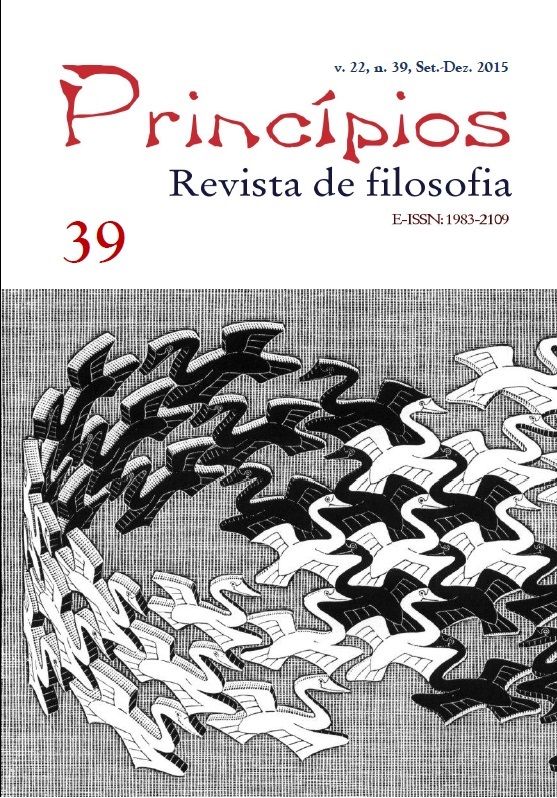Minimalism and the Pragmatic Frame
Palavras-chave:
Semantic minimalism, Minimal propositions, Occasionalism, Pragmatic frame, theResumo
In the debate between literalism and contextualism in semantics, Kent Bach’s project is often taken to stand on the latter side of the divide. In this paper I argue this is a misleading assumption and justify it by contrasting Bach’s assessment of the theoretical eliminability of minimal propositions arguably expressed by well-formed sentences with standard minimalist views, and by further contrasting his account of the division of interpretative processes ascribable to the semantics and pragmatics of a language with a parallel analysis carried out by the most radical opponent to semantic minimalism, i.e., by occasionalism. If my analysis proves right, the sum of its conclusions amounts to a refusal of Bach’s main dichotomies.
Downloads
Referências
AUSTIN, J. L. Truth. In: AUSTIN, J. L. Philosophical Papers. 3. ed. Oxford: Oxford University Press, 1950. p. 117-133.
BACH, K. Conversational Impliciture. Mind and Language, 9, 1994, p. 124-162.
BACH, K. The Semantic-Pragmatics Distinction: What it is and why it matters. In: TURNER, Ken. (Ed.). The Semantics-Pragmatics Interface from different points of view. Elsevier: Oxford, 1999a. p. 65-84.
BACH, K. The Myth of Conventional Implicature. Linguistics and Philosophy, v. 22, n. 4, 1999[b], p. 327-366.
BACH, K. You don’t say? Synthèse, 128, 2001, p. 15-44.
BACH, K. Context ex-machina. In: SZABÓ, Z. (Ed.). Semantics vs. Pragmatics. Oxford: Clarendon Press, 2005. p. 15-44.
BORG, E. Minimalism versus contextualism in semantics. In: PREYER, G.; PETER, G. (Ed.). Context sensitivity and semantic minimalism: essays on semantics and pragmatics. Oxford; New York: Oxford University Press, 2007.
CAPPELEN, H.; LEPORE, E. Insensitive Semantics. Oxford: Basil Blackwell, 2005a.
CAPPELEN, H.; LEPORE, E. A Tall Tale: in Defence of Semantic Minimalism and Speech Act Pluralism. In: PREYER, G.; PETER, G. (Ed.). Contextualism in Philosophy. Oxford: Clarendon Press, 2005b. p. 197-220.
DAVIDSON, D. Truth and Meaning. In: DAVIDSON, D. Inquiries into Truth and Interpretation. Oxford: Oxford University Press, 2001. p. 17-40.
GRICE, P. Studies in the Ways of Words. Cambridge; London: Harvard University Press, 1989.
GARCÍA-CARPINTERO, M. Recanati on the semantics/pragmatics distinction. Crítica: Revista Hispanoamericana de Filosofía. v. 38, n. 112, 2006, p. 35-68.
KALISH, D. Semantics. In: EDWARDS, P. (Ed.). The Encyclopedia of Philosophy. New York: Macmillan, 1967. Vol. X, p. 348-358.
KAPLAN, D. Demonstratives: an essay on the semantics, logic, metaphysics, and epistemology of demonstratives. In: ALMOG, J.; PERRY, J.; WETTSTEIN, H. (Ed.). Themes from Kaplan. Oxford; New York: Oxford University Press. 1989. p. 481-563
LEWIS, D. General Semantics. Synthèse, 22, 1970, p. 18-67.
RECANATI, F. Literal Meaning. Cambridge: Cambridge University Press, 2004.
RECANATI, F. Literalism and Contextualism: Some Varieties. In: PREYER, G.; PETER, G. (Ed.). Contextualism in Philosophy. Oxford: Oxford University Press, 2005. p. 171-196.
TRAVIS, C. Insensitive Semantics. Mind and Language, 21, 2006, p. 39-49.
TRAVIS, C. Occasion-Sensitivity. Oxford: Oxford University Press, 2008.
Downloads
Publicado
Como Citar
Edição
Seção
Licença
Autores mantêm os direitos autorais e concedem à revista o direito de primeira publicação, com o trabalho simultaneamente licenciado sob a Licença Creative Commons Attribution que permite o compartilhamento do trabalho com reconhecimento da autoria e publicação inicial nesta revista.
Termos da licença:
| Não Comercial (NC) | Os licenciados podem copiar, distribuir, exibir e executar a obra e fazer trabalhos derivados dela, desde que sejam para fins não comerciais. |
| Compartilha Igual (SA) | Os licenciados devem distribuir obras derivadas somente sob uma licença idêntica à que governa a obra original ou menos restritiva. |


 Português (Brasil)
Português (Brasil) English
English Español (España)
Español (España) Français (Canada)
Français (Canada)


